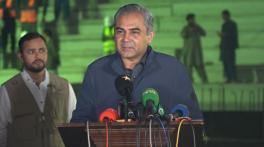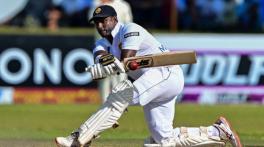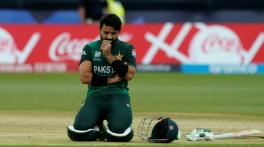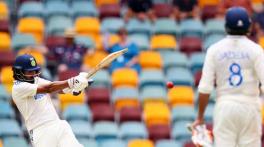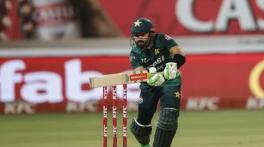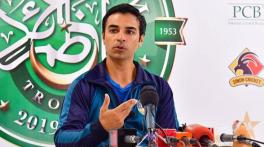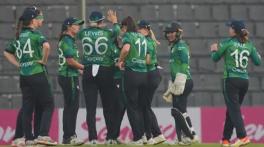2024 was a year of mixed fortunes for Pakistan cricket. The team showcased flashes of brilliance but was often undone by inconsistency and some heartbreaking defeats.
Disastrous start to 2024
Pakistan started 2024 with Shan Masood's first assignment as Test captain, hampered with a whitewash Test series defeat 3-0 on Australian soil.
The disappointment continued as the green shirts soon suffered a 4-1 loss in the T20I series against New Zealand, followed by a draw in the home series with the same team—a result that showcased resilience but also felt like a missed opportunity.
PSL 2024 glory goes to United
A standout moment in March was the thrilling finale of the PSL 2024, where Islamabad United lifted the PSL title for the third time.
In a nail-biting clash, they defeated Multan Sultans, with young Hunain Shah hitting the winning runs and easing the pressure on skipper Shadab Khan's shoulders.
It was a significant triumph for Islamabad, a crowning achievement in an exciting season of the Pakistan Super League.
Stairs of wins and losses for Pakistan
The road to the 2024 T20 World Cup was far from a smooth ride for Pakistan—it was a staircase with jagged, uneven steps.
Starting on a high note, the team secured a 2-1 series victory against Ireland, sparking hopes of consistency and dominance.
Yet, as the year unfolded, the highs gave way to sobering lows, culminating in a 2-0 defeat to England—a harsh reality check that exposed cracks in their armor.
Pakistan sink to new low in T20 World Cup
Pakistan’s T20 World Cup 2024 journey was cut short after the team failed to advance past the group stage, suffering defeats to both India and the USA.
In their much-anticipated clash with India, Pakistan put up a spirited fight but ultimately lost by six runs while chasing a modest target of 120 runs.
The losing streak continued as Pakistan faced a shocking defeat to the USA in a thrilling Super Over finish.
Pakistan’s elimination from the tournament was confirmed when the match between the USA and Ireland was washed out, sealing their exit from the competition.
First ever Test white-wash against Bangladesh
The Test series against Bangladesh left a significant impact on Pakistani cricket fans, as the national team not only suffered their first-ever defeat to the Tigers but also their first home loss in the longest format since 2001.
Prior to this series, the two teams had met 13 times, with Pakistan winning 12 and one match ending in a draw.
This defeat placed immense pressure on Pakistan's red-ball captain Shan Masood, who had yet to secure a series win.
Industrial fans change Pakistan's fortune in Tests
An unexpected link between cricket and industrial fans emerged when these powerful wind devices played a key role in turning the tide during a Test series against England.
After the defeat in the first Test, the Pakistan Cricket Board made drastic changes to the squad, dropping key players such as Babar Azam, Naseem Shah and Shaheen Shah Afridi, while introducing spinners Noman Ali and Sajid Khan.
The ground staff implemented innovative techniques, including gas-powered patio heaters and large industrial fans, to prepare dry pitches for the second Test in Multan, which proved successful.
This strategy was also applied to the Rawalpindi Test.
In the final two Tests, Noman and Sajid dominated England's batters, taking 39 out of 40 wickets, while Kamran Ghulam's debut century in the last match added to the team's victory.
Dream start to Rizwan's captaincy tenure in Australia
In a breathtaking series of twists, Pakistan, led by the ever-resilient Mohammad Rizwan, defied the odds on Australian turf, sealing a 2-1 win in a three-match ODI series.
It was a historic victory for the green shirts — the first of its kind on Australian soil since 2002.
With a blend of clinical bowling and intelligent batting, Pakistan thrived on the unpredictable, bouncy pitches, claiming a well-earned victory that had seemed a distant dream.
But just as the celebrations began, the euphoria quickly faded in the T20 series, where the Green Shirts were swept aside 3-0, failing to tame the fiery Australian pace attack.
Pakistan rolls over Zimbabwe
Rizwan’s captaincy journey was off to a stellar start. Fresh from a victorious ODI campaign in Australia, he led his team to another triumph in Zimbabwe, clinching the series 2-1.
But the leadership baton didn’t stop there. Agha Salman took charge for the T20I series and continued the winning streak, guiding the side to a 2-1 victory.
PCB's 'fusion formula' resolves Champions Trophy dispute
Amidst the anticipation for the Champions Trophy 2025, Pakistan's bid to host the prestigious event faced a significant setback when the BCCI refused to visit.
The uncertainty surrounding the hosting rights reached a critical juncture when PCB Chairman Mohsin Naqvi’s bold vision to hold the entire tournament in Pakistan began to take shape.
This vision ignited heated discussions within the ICC, with board meetings spanning months as Naqvi firmly stood his ground. Naqvi’s unyielding stance became the game-changer.
He transformed what seemed like a potential loss into a triumph for Pakistan. Despite external pressure from the ICC and BCCI, he pushed the boundaries, proposing a groundbreaking 'fusion formula.'
This innovative agreement proposed a three-year deal in which both teams would play their matches at neutral venues, avoiding the respective host countries of the tournaments.
Picture this: India facing off in Dubai for their Champions Trophy matches, while Pakistan is set to play their 2026 T20 World Cup matches in Colombo.
This strategic approach allowed Pakistan to maintain leverage and slowly turned the tide. With sheer determination, PCB secured a significant win.
The ICC, acknowledging the strength of Pakistan's position, eventually announced the Champions Trophy schedule.
Karachi, Lahore and Rawalpindi were named the venues, with Dubai also in the mix, marking a monumental victory for Pakistan’s cricketing future.
Historic whitewash in South Africa
What started as a bitter defeat in the T20I series—where Pakistan fell short 2-0—became the spark for an unforgettable turnaround. The team, stung by the loss, steeled themselves for a grueling ODI campaign and what followed was nothing short of remarkable.
The players, driven by determination, fought tooth and nail, refusing to back down.
It was star batter Saim Ayub, whose sizzling performance turned the tide in Pakistan's favour and gave the Men in Green the momentum they needed.
With each boundary and every run, Ayub's display of skill and resilience became the cornerstone of Pakistan’s success.
In an unprecedented feat, Pakistan not only clinched the series but handed South Africa a crushing 3-0 whitewash—an achievement that no team had ever managed on African soil.
Shifts in captaincy
Pakistan cricket witnessed a whirlwind of leadership changes in 2024.
The shift in leadership dates back to 2023 when Babar Azam stepped down as the all-format captain. As a result, Shan Masood was appointed as the Test captain, while Shaheen Shah Afridi were given the leadership of the T20 side.
Shaheen could led Pakistan in only one series — a five-match outing against New Zealand, and failed to achieve a desired outcome as the green shirts suffered a 4-1 defeat.
Shaheen’s tenure was also reportedly marred by a disastrous PSL 2024 campaign, which saw Lahore Qalandars winning only one out of their 10 league-stage matches.
Later, PCB brought Babar back and made him the white-ball captain, but his journey also turned out to be a rollercoaster ride.
From a 2-2 deadlock against New Zealand on home soil to a series victory over Ireland after a shaky opening loss, Babar’s reign was marked by highs and lows.
Pakistan's early exit in the T20 World Cup, with losses to India and the USA, raised questions about Babar’s leadership, eventually culminating in his resignation.
Mohammad Rizwan took over, delivering historic ODI series wins against Australia and South Africa and now has his sights set on the Champions Trophy 2025 at home.
A season of defeats for Pakistan women
2024 proved to be a challenging year for Pakistan’s women's cricket team. The year began with disappointing series losses to West Indies at home – a 3-0 defeat in WODIs and 4-1 in WT20Is.
The team's struggles continued on their tour to England, where they faced a 3-0 whitewash in WT20Is and a 2-0 loss in WODIs.
However, the team showed resilience at the ACC Women's Asia Cup, reaching the semi-finals after victories over Nepal and UAE. But their hopes were dashed by a loss to eventual champions Sri Lanka.
Pakistan's T20I journey this year was equally disappointing – out of 19 matches, they claimed victory in just five, while 14 slipped through their fingers.
In the ODI arena, it’s been a tough run, with six matches played and not a single win to their name.
Historic year for Pakistan blind cricket team
The Blind cricket team did the unthinkable in 2024, shattering expectations and rewriting the history books with their extraordinary triumph.
Pakistan’s blind cricket team etched their name in the annals of sports by clinching their maiden Blind T20 World Cup, a victory that resonated far beyond the boundary ropes.
In an unforgettable final, they crushed Bangladesh by a remarkable 10 wickets, showcasing skill, determination, and an unyielding spirit.
The competition, which first kicked off in 2012, had been dominated by India in the previous three editions, with the Men in Blue claiming victory in each tournament.
But this year, Pakistan, in the absence of their arch-rival, showcased dominance and lifted the trophy in a thrilling fourth edition that took place on the home soil.
Looking ahead, 2024 may have been a year of contrasts, but Pakistan’s cricketing journey is far from over.
With a new generation of stars emerging and a collective determination to conquer the game, the nation has set its sights on dominating global cricket in the coming years.
